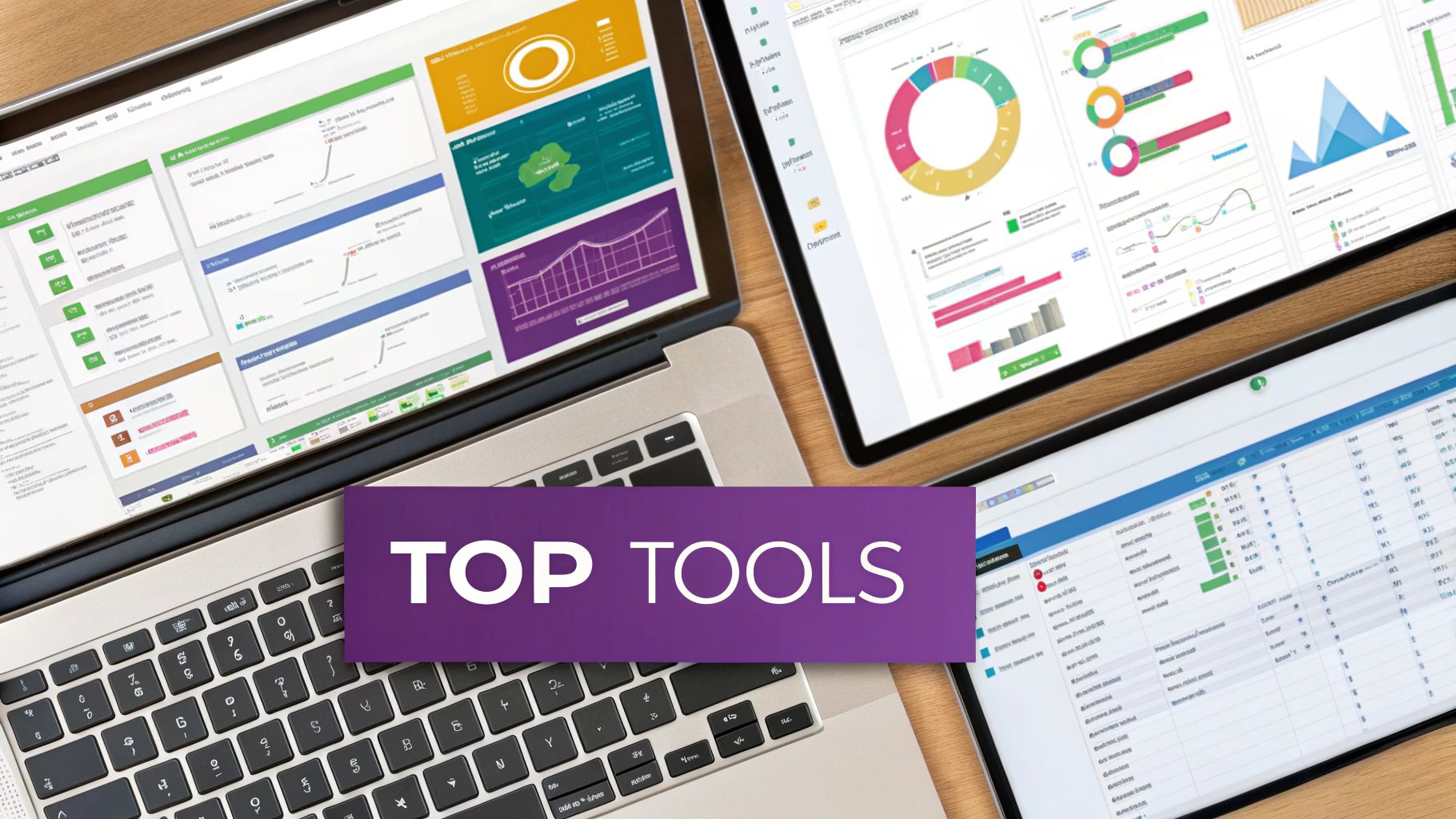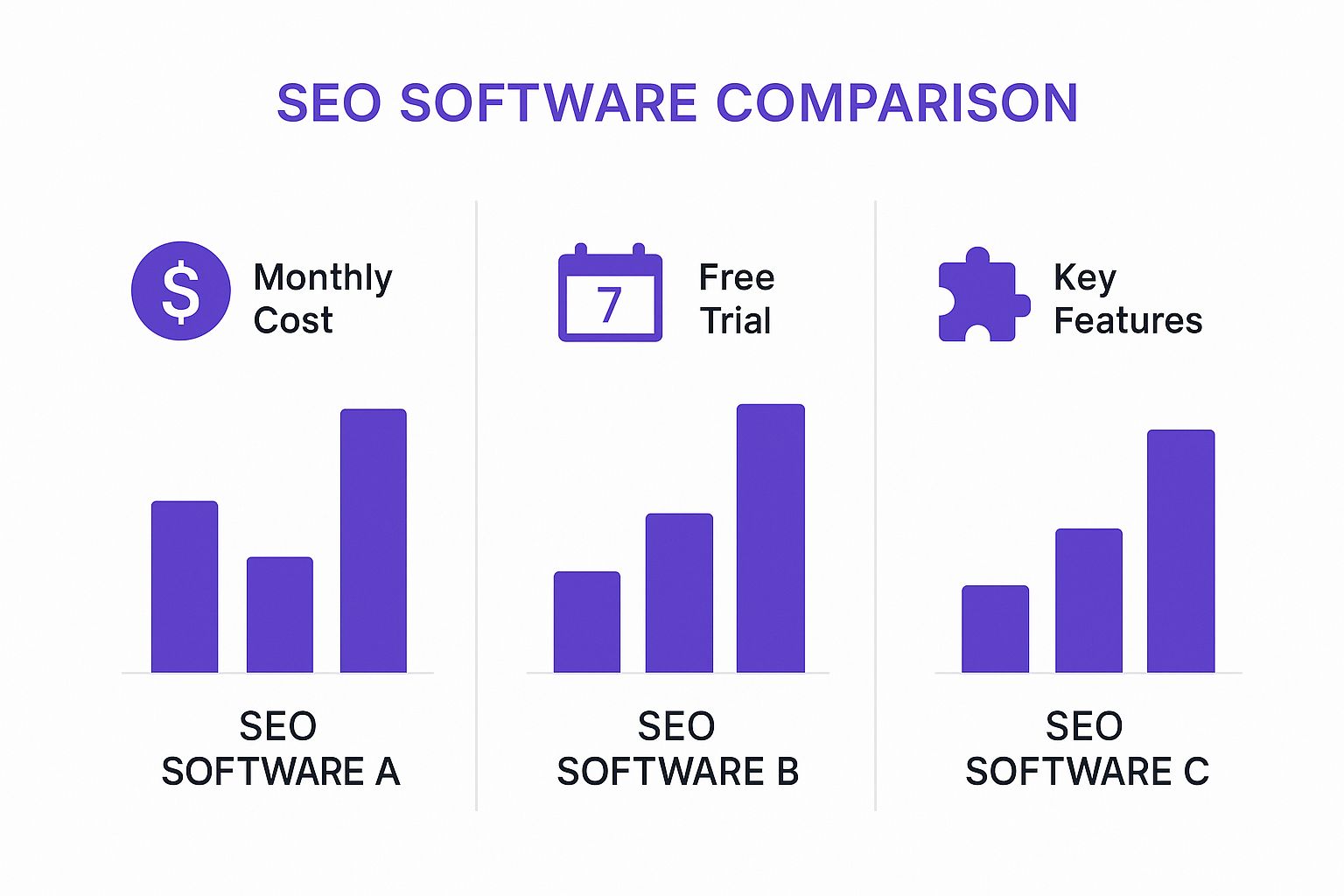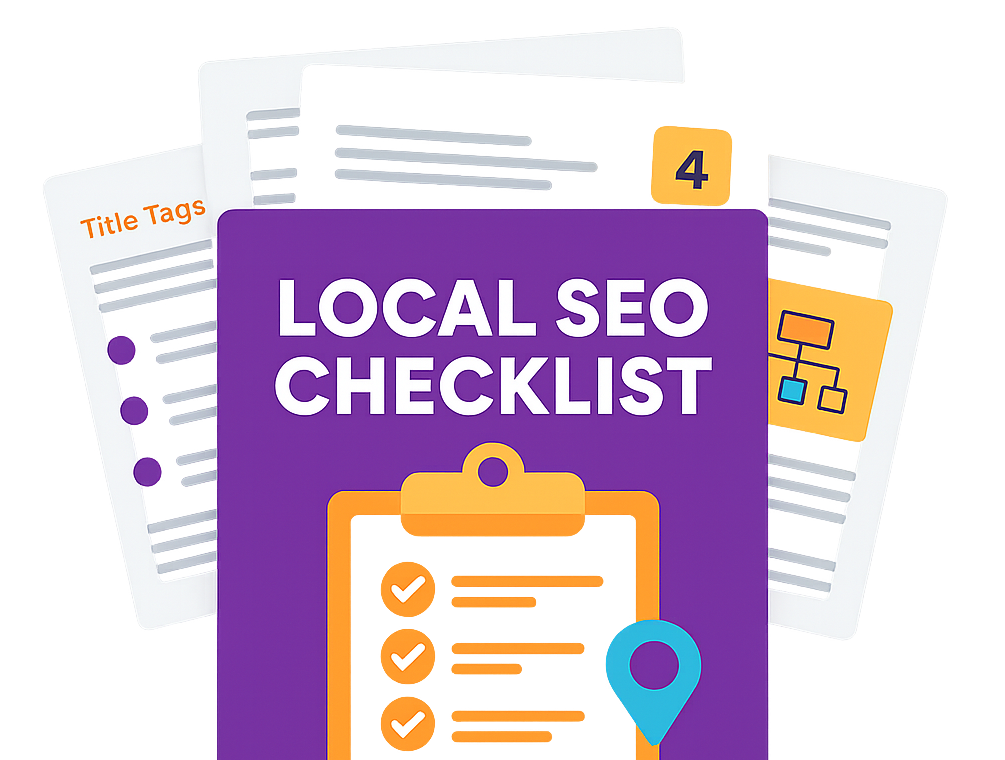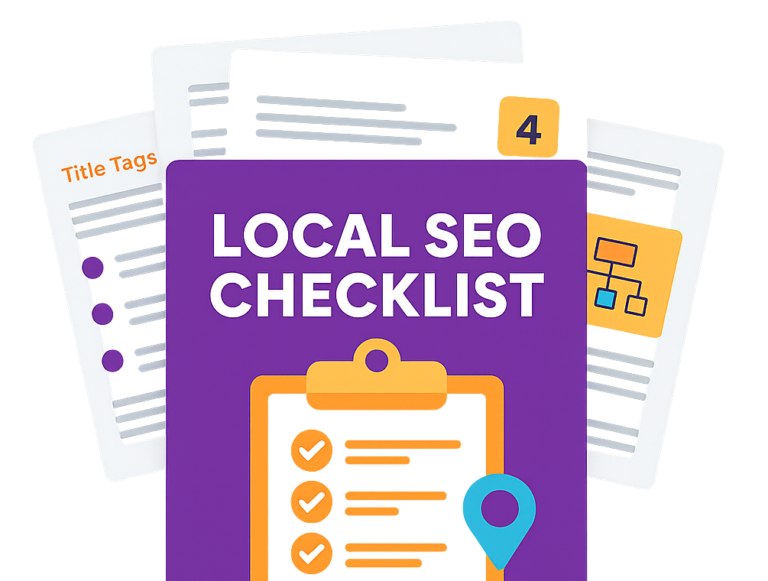Choosing the right SEO software often feels like a fork in the road. On one path, you have the sprawling, all-in-one suites like Semrush and Ahrefs that do a bit of everything. On the other, you find highly specialised tools like Surfer SEO or Screaming Frog, which are masters of one trade.
The truth is, there’s no single "best" option. The right choice comes down to your business, your budget, and how deep you're willing to go.
Choosing Your SEO Software For The UK Market
Picking the right SEO software is a make-or-break decision for any UK business serious about its digital footprint. The market is absolutely packed with options, and it’s easy to get lost in the noise. A one-size-fits-all approach just doesn't cut it; what works for a local Bristol bakery is worlds away from what a national e-commerce brand needs. That's why a proper SEO software comparison is essential.
The UK market for these tools is exploding. Spending is set to more than double, rocketing from over £4 billion to nearly £9 billion by 2030. While big corporations used to dominate this space, it’s now the small and medium-sized enterprises (SMEs) that are growing fastest. SEO tools are no longer just for the giants.
To get a clearer picture, it helps to look at how specific tools compare head-to-head. When you’re weighing your options, digging into lists of Surfer SEO alternatives and similar comparisons can reveal which platform truly fits your workflow.
Core Comparison Criteria
To give you practical, real-world guidance, our analysis is built on four key pillars:
- Feature Depth and UK Data Accuracy: How good are the tools at handling UK-specific searches? Is their local data actually reliable?
- Scalability: Will the software support you as you grow from a scrappy start-up to a larger company?
- User Interface: Is the platform intuitive enough for daily use, or will you need a manual just to find what you’re looking for?
- Value for Money: Does the price in pounds sterling (£) genuinely match the value it delivers for a UK business?
A quick look at the top contenders reveals just how different their strengths are.
At a Glance SEO Software for UK Businesses
Here's a snapshot of the leading SEO platforms, highlighting where they shine and which type of UK business they're best suited for. This table is designed to give you a quick, high-level overview before we dive into the details.
| Software | Best For | Key UK Strength | Starting Price (Est. £) |
|---|---|---|---|
| Semrush | All-Rounder for SMEs | Extensive UK keyword database & competitor analysis. | ~£110/month |
| Ahrefs | Data-Driven Marketers | Superior backlink analysis & content gap tools. | ~£99/month |
| SE Ranking | Local UK Businesses | Strong local rank tracking & GBP optimisation. | ~£52/month |
| Surfer SEO | Content-Led Brands | Advanced on-page & content brief optimisation. | ~£80/month |
As you can see, the "best" tool really depends on your primary goal. A business focused on local services in Manchester has very different needs from a content-heavy brand targeting a national audience.
A Deep Dive into Core SEO Functionalities

Once you get past the polished marketing claims, you find the real value of any platform in an SEO software comparison: its core functionalities. These are the tools you’ll be using every single day to analyse, strategise, and run your campaigns. The small, practical differences between them will ultimately shape your workflow and your success.
Many SEO suites boast an impressive list of features, but how they perform can be a different story, especially within the UK market. A tool might have a massive keyword database, but if it lacks the granular, regional data a local business in Cambridge needs, it’s not much use. This is where a proper, nuanced analysis is essential.
Scrutinising Keyword Research Tools
Good keyword research is the absolute bedrock of any decent SEO strategy. Most platforms will give you the basics like search volume and difficulty scores, but the best tools dig much deeper, offering insights that are actually tailored to specific markets. For any UK business, this means prioritising software with a robust and frequently updated google.co.uk database.
Let’s imagine a London-based e-commerce shop wants to rank for "handmade leather bags". A top-tier tool shouldn’t just spit out a search volume number. It should also show you:
- Regional Variations: The difference in search interest between London, Manchester, and Edinburgh.
- User Intent: Whether a keyword is informational ("how to clean leather bags"), commercial ("best leather bags uk"), or transactional ("buy leather bags online").
- SERP Feature Analysis: Which keywords trigger map packs, shopping results, or featured snippets in Google.
Some platforms are brilliant at uncovering long-tail opportunities, while others, like Ahrefs, are famous for the accuracy of their keyword difficulty metrics. Your choice really boils down to whether you want to discover new niches or go head-to-head with established competitors.
On-Page and Technical Audit Capabilities
Having a technically sound website isn't a "nice-to-have" anymore; it's non-negotiable if you want to rank well on Google. SEO software automates the painful process of finding and fixing all the technical gremlins that could be holding your site back. The real differentiators are the depth of the audit and how clearly the recommendations are presented.
A great technical SEO audit doesn't just list errors; it prioritises them based on impact. It should clearly explain why a slow page load time or a broken internal link matters and provide actionable steps to resolve it, turning complex data into a clear to-do list.
Take Screaming Frog, for instance. It offers an almost overwhelming level of depth for technical analysis, letting you hunt down every last broken link, redirect chain, and piece of duplicate content. On the other hand, platforms like Semrush present this information in a much more user-friendly dashboard, with prioritised recommendations that are easier for non-specialists to understand and act on.
Any comprehensive audit module worth its salt should cover:
- Site Speed: Analysis of Core Web Vitals and concrete suggestions for improvement.
- Mobile-Friendliness: Checks for any and all mobile usability issues.
- Crawlability: Identifies errors that stop search engines from indexing your site properly.
- On-Page Elements: Flags missing title tags, meta descriptions, and improper heading structures.
The best software in this SEO software comparison goes a step further by integrating these technical checks with content optimisation suggestions. Tools like Surfer SEO, for example, connect on-page analysis directly to the content creation process, giving you real-time feedback as you write. It’s this blend of technical and content guidance that sets modern, effective platforms apart from the simpler crawlers of the past.
The Impact of AI on Modern SEO Platforms

Let's be honest, Artificial Intelligence isn't just some shiny new toy anymore. It's now baked into the core of almost every serious SEO platform, and it’s completely changing how we tackle digital marketing. AI is the secret sauce that moves a tool from just showing you data to actively helping you strategise.
This shift is especially noticeable in the UK. Google still holds a massive 93.35% of the search market share, but the way we interact with it is changing fast. AI tools are booming, with ChatGPT alone grabbing 78.31% of the UK's AI chatbot audience. It’s a clear signal: if an SEO platform doesn't have powerful AI features, it’s already falling behind.
For any business, this means the software you choose should do more than just track keywords. It should be your partner in predicting trends, sharpening your content, and spotting technical hiccups before they turn into major headaches.
How AI Is Redefining SEO Tasks
When we talk about AI in SEO, we're not talking about a single feature. It's a whole collection of technologies—like machine learning and natural language processing—that make various SEO jobs smarter and more efficient. It’s a world away from the mind-numbing manual data crunching we were all doing just a few years ago.
Here's a look at how different platforms are putting AI to work for us:
- Automated Content Briefs: Forget spending hours manually picking apart top-ranking pages. AI can spit out a detailed content brief in minutes. It identifies the common headings, user questions, and crucial keywords, giving your writers a solid, data-driven roadmap to follow.
- Predictive Keyword Analysis: AI goes way beyond simple search volume. It can forecast a keyword's potential to drive traffic and even conversions by analysing SERP volatility and user intent. This helps you focus on the keywords that will actually deliver results, not just vanity metrics.
- Smarter Technical Audits: AI is brilliant at finding tricky technical SEO problems that are easy to miss, like subtle crawl budget waste or patterns in site speed issues. Better yet, it prioritises the fixes based on how much they'll impact your rankings, so you know exactly where to start.
The real magic of AI in SEO software is its ability to connect the dots. It can see how a technical issue directly caused a rankings drop for a specific group of keywords—a level of analysis that would take a human analyst hours, if not days, to piece together.
These AI features are powered by sophisticated large language models. If you want to get a better sense of what's under the bonnet of these tools, it's worth understanding LLM leaderboard trends, as these models are what make the latest features possible.
Ultimately, the goal of all this AI wizardry is to save you time and give you a genuine strategic edge. Our guide on using AI for SEO dives deeper into these applications. By choosing a tool with strong AI capabilities, you’re not just staying current—you’re setting your SEO strategy up for the future.
How the Top SEO Platforms Handle Local SEO for UK Businesses
For countless UK businesses, from a local bakery in Brighton to a service-area plumber covering Greater Manchester, online success is won or lost at the local level. This makes a deep dive into local SEO features a critical step in any meaningful SEO software comparison. It’s not about having the biggest global keyword database; it’s about mastering the tools that drive footfall and phone calls.
The market for local SEO tools in the UK is booming, and for good reason. With Google’s mobile-first approach firmly in place and nearly 46% of all local searches leading to a store visit within a day, UK businesses simply can’t afford to ignore their own backyard. These specialised tools are now essential for managing local listings, keeping an eye on your reputation, and optimising for Google Maps to grab that vital local market share.
What Really Matters for Local Dominance?
When you’re weighing up different platforms, the focus has to shift from broad, vanity metrics to the nitty-gritty of location-specific features. The needs of a nationwide e-commerce brand are worlds away from those of a brick-and-mortar shop.
For any local business, these are the features to really scrutinise:
- Google Business Profile (GBP) Integration: Can you manage your GBP listing without leaving the platform? This means being able to publish posts, answer customer questions, and respond to reviews, all in one place.
- Hyper-Local Rank Tracking: How well does the tool track your position for crucial keywords like "plumber near me" or "best coffee in Leeds"? You need accuracy at a city or even postcode level—anything less is a waste of time.
- Citation Management: Citations are simply mentions of your business's name, address, and phone number (NAP) across the web. The best tools will audit your existing citations for consistency and help you build new, high-quality ones on relevant UK directories.
The chart below gives a simplified view of how to weigh up your options when you’re first looking.

As the graphic shows, price often tracks with the number of features you get, but a generous free trial can be a game-changer, letting you test the most important functions before you commit.
Picking the Right Tool for the Job
Let's look at two different scenarios. A new London restaurant needs a tool that’s brilliant at review management and scheduling GBP posts to pull in tourists and locals alike. In contrast, a nationwide plumbing franchise with teams in multiple cities needs a platform with powerful, multi-location rank tracking and citation-building features to maintain consistent visibility everywhere they operate.
For most SMEs, the real test is how well a platform centralises these local tasks. A tool that combines review monitoring with accurate, postcode-level rank tracking and simple GBP management offers incredible value by saving time and unifying your strategy.
Choosing the right platform nearly always comes down to these specific, on-the-ground requirements. To dig deeper, check out our guide on the best local SEO tools in 2023, which offers more detailed picks.
Ultimately, the best software will feel like a natural extension of your marketing efforts, giving you clear, actionable insights that translate directly into more customers walking through your door.
Looking at Pricing Plans and Getting Real Value for Your Money

Let's be honest, the best SEO software isn't just the one with the biggest feature list. It's the one that actually makes you money. A clear-headed look at the price tag is a huge part of any SEO software comparison, because you need a tool that fits your budget and helps you hit your goals. Most software is sold in tiers, so you really have to dig into what you’re getting at each level.
It’s easy to get drawn in by a low monthly fee, but you need to watch out for the hidden costs. These often sneak up on you in the form of limits—on how many projects you can run, how many people can use the account, or the number of keywords you can track. A plan that looks like a bargain can get expensive fast once you start paying for the add-ons you actually need to get the job done.
Finding the Sweet Spot in Pricing Tiers
Figuring out what "good value" means comes down to matching the cost to what your business actually looks like right now. What's a fantastic deal for a marketing agency could be a complete waste of money for a solo business owner. When you look at different software pricing plans, think about what you need today and where you plan to be in a year or two.
For a UK start-up or a small local business, an entry-level plan from a tool like SE Ranking—which starts at around £52 per month—can be a brilliant investment. You get all the essential features for tracking keywords and checking your site's health, but without the overwhelming complexity and cost of a massive enterprise suite. It’s a smart way to build a solid SEO foundation without blowing your budget.
In my experience, many small businesses get the best of both worlds by pairing a focused tool with affordable SEO services for small business. This gives you the right tech alongside expert guidance to make sure you're using it effectively.
The best investment is always one that can grow with you. A good pricing model lets you move up to a higher plan as your business grows, so you’re never paying for features you don’t use or feeling held back by silly limitations.
Knowing When to Spend More
On the other hand, if you're running a fast-growing e-commerce site or a digital marketing agency, you’ll outgrow a basic plan in no time. For these kinds of businesses, investing in a higher-tier subscription from a platform like Semrush (which will set you back £110+ per month) or Ahrefs is a no-brainer.
That higher price tag unlocks features that are absolutely vital for scaling up your work.
- API Access: This is a game-changer. It lets you pull SEO data directly into your own custom dashboards or client reports, which looks far more professional.
- More Projects & Users: If you're an agency juggling multiple clients or have a few marketers on your team, you simply can't function without higher limits.
- Deeper Data & Historical Trends: Getting access to years of historical data is critical for proper competitor analysis and building a strategy that looks beyond next week.
At the end of the day, getting value for your money isn't about finding the cheapest tool on the market. It’s about making sure every pound you spend on software is directly helping you grow your business.
Final Recommendations for UK Businesses
Alright, let's cut to the chase. Choosing the right SEO software isn't just about picking the one with the most features. It's about finding the platform that slots perfectly into your specific business needs. After putting these tools through their paces, we’ve boiled it down to a few clear recommendations for UK businesses.
Think of this as your starting point for making a confident investment.
The Best All-Rounder for Growing SMEs
For most small and medium-sized businesses that need a bit of everything, Semrush is the clear winner. It's a proper workhorse, packing a comprehensive toolkit that handles everything from keyword research and technical audits to digging into what your competitors are up to.
Its UK keyword database is massive and reliable, making it a solid choice for any business targeting a national audience. Crucially, it gives you room to grow without feeling like you've immediately outgrown your subscription.
The Strongest for Data-Driven Marketers
If you're the kind of marketer who lives in spreadsheets and bases strategy on hard data, Ahrefs is your tool. Its backlink analysis is simply unmatched, giving you everything you need to reverse-engineer competitor strategies and unearth high-value link opportunities.
For anyone who gets a thrill from granular analysis, the Content Gap and Link Intersect tools are genuinely powerful. They turn data into a real competitive advantage.
The real differentiator is a tool's ability to not just present data, but to make it actionable. A platform that directly links a competitor's success to specific content pieces or backlink sources gives you a clear roadmap to follow.
The Top Choice for Local Businesses
For brick-and-mortar shops and local service providers, SE Ranking offers incredible value for money. It's tailor-made for dominating a local market, with specialised features like postcode-level rank tracking and integrated Google Business Profile management.
It hands you the exact tools needed to drive footfall and local enquiries, all without the hefty price tag of an enterprise platform. Getting these fundamentals right is a massive step in learning how to rank higher on Google for local searches.
The Most Scalable for Agencies
Digital marketing agencies juggling a roster of clients need a platform built for pure efficiency and scale. Here again, Semrush really shines. Features like API access, white-label reporting, and generous user allowances on its higher-tier plans are non-negotiable for agency work.
This level of customisation and scalability is essential for managing a diverse portfolio of clients without getting bogged down in administrative headaches.
Got Questions? We’ve Got Answers
Diving into the world of SEO software can feel a bit overwhelming. Let's tackle some of the common questions UK businesses have when they're trying to choose the right platform.
Which SEO Software Has the Most Accurate UK Keyword Data?
This is a big one. While no tool is 100% perfect, platforms like Ahrefs and Semrush are industry heavyweights for a reason. They have massive, constantly refreshed UK keyword databases that are generally very reliable.
But "best" really depends on what you need. One tool might have a slight edge in getting keyword difficulty scores right, while another is better at spotting local search volume trends. A national e-commerce brand might care more about those trend insights, whereas a local service business in Manchester absolutely needs accurate, city-level search numbers.
The only way to know for sure is to take them for a spin. Use the free trials. Plug the same handful of your most important UK keywords into a couple of platforms and see which one gives you data that feels right for your business.
Do I Really Need an All-in-One Suite, or Can I Just Use Separate Tools?
It’s the classic debate: convenience versus specialisation. For most small and medium-sized businesses, an all-in-one suite is the way to go. Having your rank tracking, site audits, backlink analysis, and competitor research all under one roof is a massive time-saver. It makes connecting the dots between different SEO activities so much easier.
However, if you're a specialist, you might prefer a dedicated tool. A technical SEO consultant, for instance, will get far more granular crawling data from a tool like Screaming Frog than from the built-in site auditor of an all-in-one platform. The trade-off is that this approach usually costs more in total and means you’re manually piecing together data from different dashboards.
How Much Should a Small UK Business Budget for SEO Software?
A realistic starting point for a proper, powerful SEO software plan is around £100 per month. Most of the top-tier platforms use a tiered pricing structure, which is great because it lets you scale. You can jump in with a more affordable plan and only upgrade when your business grows and the need arises.
When you're looking at the price tag, try to think beyond the monthly fee. The right software isn't a cost; it's an investment. It will save you dozens of hours of manual research and give you the data you need to climb the rankings, pull in more traffic, and ultimately, grow your revenue.
Ready to stop guessing and start ranking? Bare Digital offers a free, no-obligation SEO Health Check. We'll give you a transparent, tailored Activity Plan showing you exactly how we can boost your visibility and deliver measurable results.
Get your free SEO proposal today.








